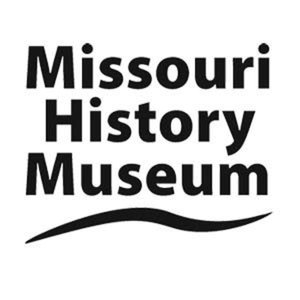from Feb. 12, 1928
"Tragedy of Lincoln's Death Halted Feast of Rejoicing"
-
Full Title
"Tragedy of Lincoln's Death Halted Feast of Rejoicing"
-
Description
In 1928, Robert Brown recounted his childhood as the son of White House butler and waiter Peter Brown. Peter Brown, a formerly enslaved man, worked in the Lincoln White House. In the interview, Robert Brown discussed his early childhood in Virginia, his family's move to Washington, getting to know President Lincoln and his children, and learning of Lincoln's assassination. The newspaper page also includes other articles about Lincoln.
-
Transcription
[interviewer:] "Where were you on the night of the assassination?"
[Brown:] "I was home on Twelfth street., between O and H. about three or four blocks from Ford's. It was about half past 10 and I was taking off my clothes to go to bed. My father had just left the house, saying he had orders to return to the Executive Mansion about 11 and help with a supper they intended to have, and he would be beck when he could, but he didn't say what time. He went out and I was just ready to crawl into bed when I heard a big commotion in the street, men running this way and that, people shouting, military giving orders, horses dashing by. When I stuck my head out the door some one ran up, saying Mr. Lincoln was shot at the theater. My mother pulled me back in the house and made me stay in bed. She said it was dangerous to be out, and we should stay in. We kept awake till my father returned and told us of the excitement over at the White House. He stayed over there trying to comfort Tad, but after putting him to bed there wasn't anything he could do, so he locked up after a while and came home. Then I fell asleep."
[interviewer:] "Who was to have made up the party over at the White House?"
[Brown:] "That I couldn't say. My father just said they were to have some kind of supper after the performance, and he was needed there."
[interviewer:] "How many were invited?"
[Brown:] "That I don't know, sir. You see, my father wasn't the steward, otherwise he would have known how many. He only helped wait on the table in emergencies, and I can't say whether he was to do table duty that night."
[interviewer:] "Were the guests coming from Ford's Theater with the Lincolns or from elsewhere?"
[Brown:] "That, sir, is beyond me." -
Source
Chronicling America: Historic American Newspapers, Library of Congress
-
Rights
This item is in the public domain.
-
Tags
-
Cite this Item
George M. Battey, Jr.. ""Tragedy of Lincoln's Death Halted Feast of Rejoicing"". The Washington Star. Remembering Lincoln. Web. Accessed November 6, 2025. https://rememberinglincoln.fords.org/node/1214
-
Creator
George M. Battey, Jr.
-
Publisher
The Washington Star
-
Date
February 12, 1928
from Feb. 12, 1928
"Tragedy of Lincoln's Death Halted Feast of Rejoicing"

-
Description
In 1928, Robert Brown recounted his childhood as the son of White House butler and waiter Peter Brown. Peter Brown, a formerly enslaved man, worked in the Lincoln White House. In the interview, Robert Brown discussed his early childhood in Virginia, his family's move to Washington, getting to know President Lincoln and his children, and learning of Lincoln's assassination. The newspaper page also includes other articles about Lincoln.
-
Source
Chronicling America: Historic American Newspapers, Library of Congress
-
Rights
This item is in the public domain.
-
Creator
George M. Battey, Jr.
-
Publisher
The Washington Star
-
Date
February 12, 1928
from Apr. 16, 1865
Sermon Preached in the African Methodist Episcopal Zion Church
-
Full Title
Sermon Preached in the African Methodist Episcopal Zion Church
-
Description
Sermon preached by Rev. Jacob Thomas in the African Methodist Episcopal Zion Church, Troy, New York. In this sermon, Rev. Thomas addresses his congregation and praises Lincoln as a true friend of African Americans while discussing what his loss means for the future. Rev. Thomas reflects on the grief of the African American community in regards to the assassination and how this was enhanced by Lincoln's status as a "friend of the oppressed."
-
Transcription
My friends, we meet at this hour with sad hearts. We have been stricken. The blow has fallen heavily upon us, and a nation mourns to day. Truly a prince and a great man in Israel has fallen. We cannot but weep bitter tears that so great and good a man as Abraham Lincoln, has been cut down in the midst of his usefulness by a death so cruel. At the moment he was about to realize the great results of his four years labor, just as victory had perched upon our banners, he fell a martyr to freedom. We shall never look upon his like again.
A few days ago joy and gladness filled every heart. All who were loyal to the government rejoiced and gave thanks to Almighty God because of the victory won, the downfall of the rebel capital. This intelligence was too glorious to be unalloyed. Ere our joy had subsided, sorrow overtook us. News reached us from Washington of the bloody deed perpetrated there. We would not believe it. It could not be possible that a creature in the form of man could be found so God-forsaken, as to take the life of the man who had malice for none but charity for all! The hours between the first rumor and the confirmation of the report, were hours of dreadful suspense. But the truth came at last. There was no longer room for doubt. It was too true, that on last Friday evening, whilst enjoying at a place of amusement a few moments of relaxation from toil, accompanied by his wife and a few friends, unconscious of danger near, he was brutally murdered — shot down by the cowardly hand of an assassin. Palsied be the tongue, withered be the arm of the guilty, execrable wretch who committed this, the blackest of all crimes. Yes, our dear President is no more. The beloved of his country, the father and friend of the oppressed, the champion of universal freedom, has fallen a victim to southern malice and revenge. Kind heaven weeps to-day over the bloody spectacle.
We, as a people, feel more than all others that we are bereaved. We had learned to love Mr. Lincoln as we have never loved man before. We idolized his very name. We looked up to him as our saviour, our deliverer. His name was familiar with our children, and our prayers ascended to God in his behalf. He had taught us to love him. The interest he manifested in behalf of the oppressed, the weak and those who had none to help them, had won for him a large place in our heart. It was something so new to us to see such sentiments manifested by the chief magistrate of the United States that we could not help but love him. Is it to be wondered at that we mourn today? Nay, we have seen old gray-headed men and young maidens weep because of this affliction. Had disease attacked him and he had passed away according to the natural course of nature, we could have consoled ourselves with the thought that it was God's will it should be so. But falling as he did by the hand of the wicked, we derive our consolation only from the assurance that by his uprightness, his honesty and his principles of Christianity, he is now enjoying that rest that remains for the just.
Our text is a fitting one for the occasion. A great man has fallen. From whatever stand-point we view Mr. Lincoln, we find in him the marks of true greatness. A few years ago this plain, homely lawyer was scarcely known outside of his own state. But how soon did he become the point of attraction. Not only was he the centre of observation in this country, but the civilized world was watching him. He far exceeded the expectations of all men. He became as the ark of safety to his country, the praise and glory of his fellow men. To us as a despised people, he was a second Moses — a second Daniel in wisdom. From a humble position in life he reached the very summit of honor, occupied the highest seat that it was in the power of the American people to give him, and filled that seat as no man ever filled it before him. The mind that conceived and drew up the Proclamation of Emancipation was a great mind. The results of this grand deed are patent to all. He was a philanthropist in the most extensive sense of the word — benevolent, kind, and ever ready to make others happy. One of the most prominent features in the character of our departed friend was his merciful disposition even towards his foes. He was strictly honest; this is admitted by his worst enemies. " Honest Abe," he was familiarly called by all classes. He was honest with his people, honest to himself, honest to his God. This is what God requires of all men, to be honest in heart. The exterior of this great man may have been plain, homely and awkward, but the interior was beautifully finished and furnished with Christian graces. It was his reliance upon God that carried him safely through the storm of four years duration. It was this that has made him blessed in the favor of God, forever.
Yes, Abraham Lincoln is no more, and we mingle our tears with those of the mourning widow and bereaved friend. We feel that in his loss our punishment is more that we can bear, yet in God is our consolation. Let us hope for the best. An all-wise God has permitted this great grief to come upon us. Let us look to him for deliverance in the time of our distress. We are humbled, we are mortified, we are brought very low. Our trust must be in God. Whilst we mourn, he whose, death we deplore, is enjoying the reward of his labor, happy with his God, mingling with those kindred spirits who went before him. The
two truest and greatest men that ever lived on earth, John Brown and Abraham Lincoln, have met in glory, and they cease not to give praise and honor to him that liveth forever and ever. The memory of Abraham Lincoln will ever be dear to us. It is engraved upon our hearts. It can never be effaced. He has been our true friend and we never can forget him. We feel as though God had raised him up for a special purpose, and that having accomplished the labor assigned him, he has gone to his rest. May God protect us and keep us from further evils. -
Source
A tribute of respect by the citizens of Troy, to the memory of Abraham Lincoln
-
Rights
This item is in the public domain and may be reproduced and used for any purpose, including research, teaching, private study, publication, broadcast or commercial use,with proper citation and attribution.
-
Tags
-
Cite this Item
Rev. Jacob Thomas. "Sermon Preached in the African Methodist Episcopal Zion Church". Young & Benson. Remembering Lincoln. Web. Accessed November 6, 2025. https://rememberinglincoln.fords.org/node/1203
-
Creator
Rev. Jacob Thomas
-
Publisher
Young & Benson
-
Date
1865
from Apr. 16, 1865
Sermon Preached in the African Methodist Episcopal Zion Church
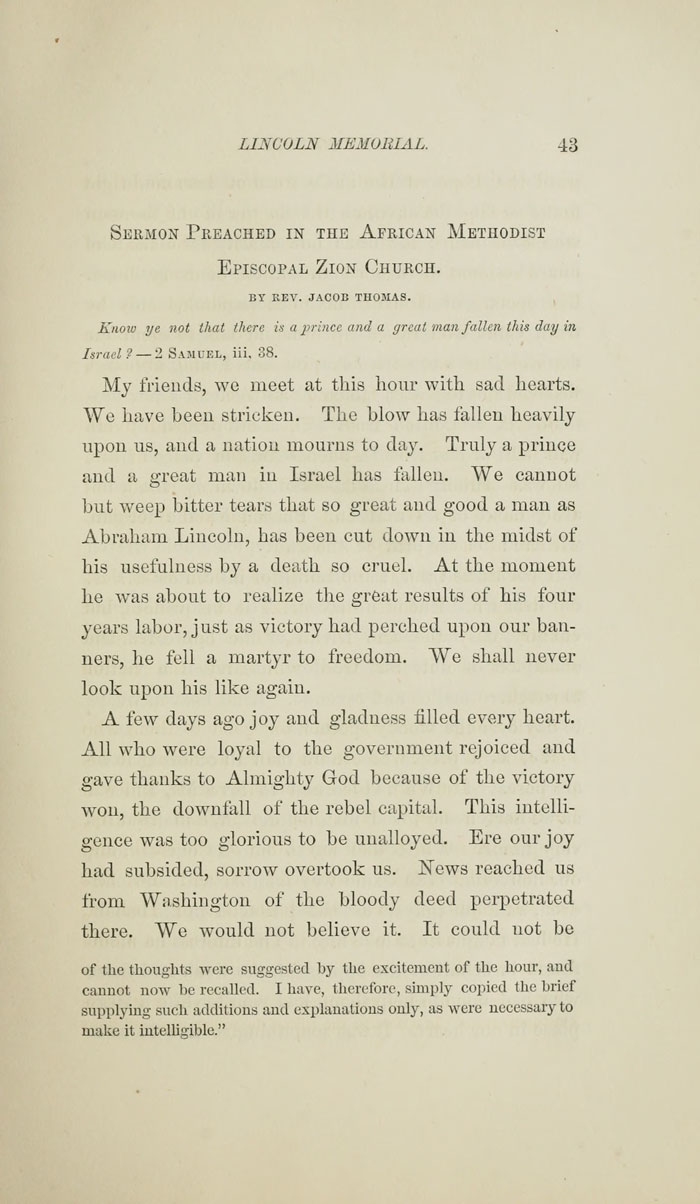
-
Description
Sermon preached by Rev. Jacob Thomas in the African Methodist Episcopal Zion Church, Troy, New York. In this sermon, Rev. Thomas addresses his congregation and praises Lincoln as a true friend of African Americans while discussing what his loss means for the future. Rev. Thomas reflects on the grief of the African American community in regards to the assassination and how this was enhanced by Lincoln's status as a "friend of the oppressed."
-
Source
A tribute of respect by the citizens of Troy, to the memory of Abraham Lincoln
-
Rights
This item is in the public domain and may be reproduced and used for any purpose, including research, teaching, private study, publication, broadcast or commercial use,with proper citation and attribution.
-
Creator
Rev. Jacob Thomas
-
Publisher
Young & Benson
-
Date
April 16, 1865
from May. 1, 1865
Excerpt from The Diary of Michael Shiner
-
Full Title
Excerpt from The Diary of Michael Shiner
-
Description
Diarist, Michael Shiner, was an African-American Navy Yard worker who chronicled events in Washington D.C over 60 years.
-
Transcription
and the Hon Abraham Lincoln with them.
and 1865
The Hon abraham Lincoln was assinated assanated on the 14 of April on good friday knight at fords theater in washing
and he died on the 15 of april 1865 on Satturday
and on friday evening before he was assanated Mr Licoln and his Lady whear Both down at the washington navy on good friday the 14 1865 -
Source
-
Rights
This item is in the public domain and may be reproduced and used for any purpose, including research, teaching, private study, publication, broadcast or commercial use, with proper citation and attribution.
-
Tags
-
Cite this Item
Michael Shiner. "Excerpt from The Diary of Michael Shiner ". Remembering Lincoln. Web. Accessed November 6, 2025. https://rememberinglincoln.fords.org/node/1170
-
Creator
Michael Shiner
-
Date
April 1865
from May. 1, 1865
Excerpt from The Diary of Michael Shiner
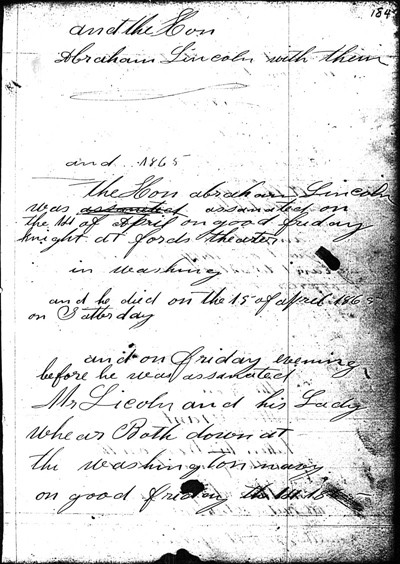
-
Description
Diarist, Michael Shiner, was an African-American Navy Yard worker who chronicled events in Washington D.C over 60 years.
-
Source
-
Rights
This item is in the public domain and may be reproduced and used for any purpose, including research, teaching, private study, publication, broadcast or commercial use, with proper citation and attribution.
-
Creator
Michael Shiner
-
Date
May 1, 1865
from May. 1, 2018
A Tribute of Respect by the Citizens of Troy
-
Full Title
A Tribute of Respect by the Citizens of Troy, to the Memory of Abraham Lincoln
-
Description
Compiled documents relating to Lincoln's assassination in Troy, New York and the citizen's mourning. It includes sermons, addresses, and minutes from meetings.
-
Source
-
Rights
This item is in the public domain and may be reproduced and used for any purpose, including research, teaching, private study, publication, broadcast or commercial use, with proper citation and attribution.
-
Tags
-
Cite this Item
Various. "A Tribute of Respect by the Citizens of Troy, to the Memory of Abraham Lincoln". J. Munsell . Remembering Lincoln. Web. Accessed November 6, 2025. https://rememberinglincoln.fords.org/node/1168
-
Creator
Various
-
Publisher
J. Munsell
-
Date
1865
from May. 1, 2018
A Tribute of Respect by the Citizens of Troy, to the Memory of Abraham Lincoln
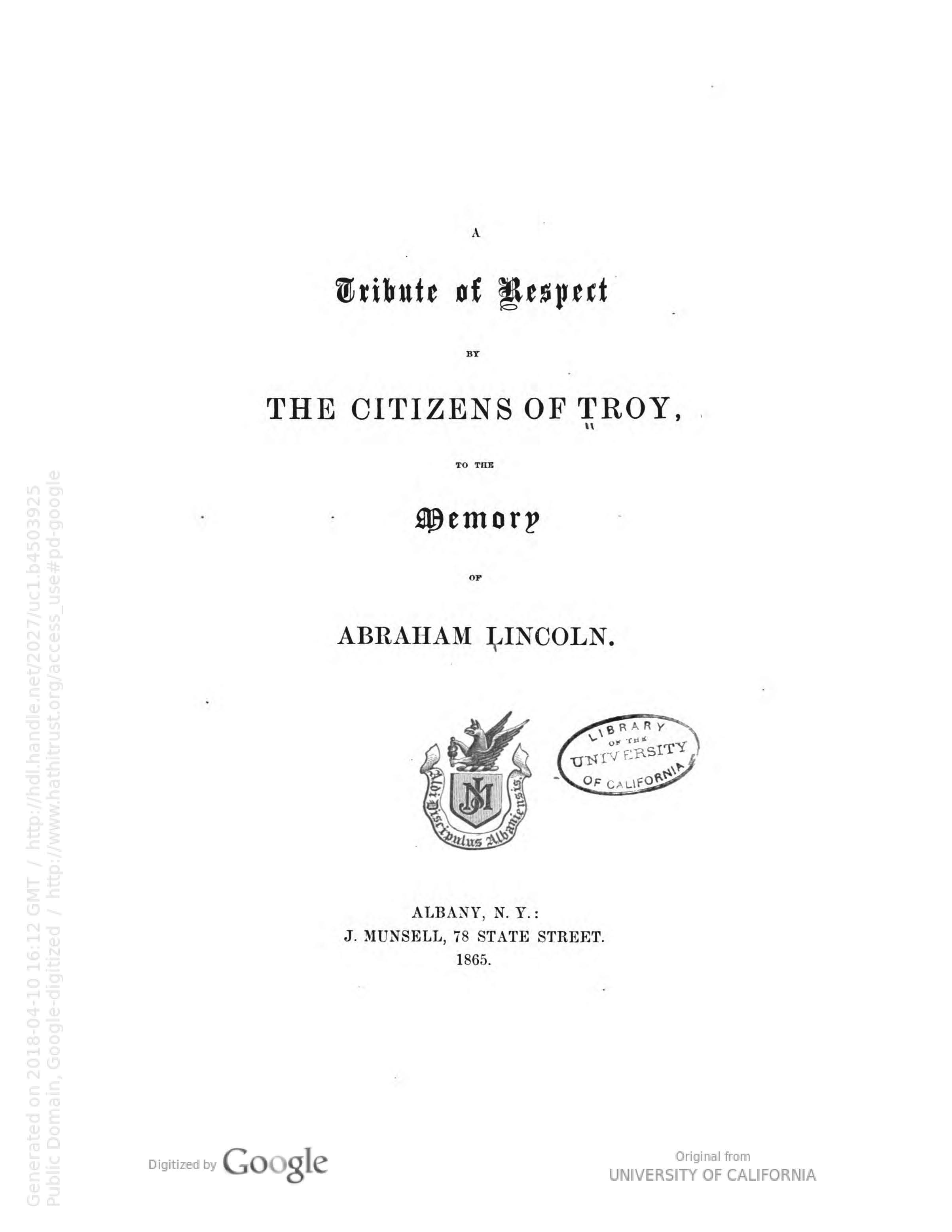
-
Description
Compiled documents relating to Lincoln's assassination in Troy, New York and the citizen's mourning. It includes sermons, addresses, and minutes from meetings.
-
Source
-
Rights
This item is in the public domain and may be reproduced and used for any purpose, including research, teaching, private study, publication, broadcast or commercial use, with proper citation and attribution.
-
Creator
Various
-
Publisher
J. Munsell
-
Date
May 1, 2018
from Jan. 9, 1866
A Speech on "Equality Before the Law"
-
Full Title
A Speech on "Equality Before the Law" Delivered by J. Mercer Langston In the Hall of Representatives in the Capitol of Missouri
-
Description
In this pamphlet put together by the Missouri State Executive Committee, a speech delivered by John Mercer Langston on January 9th, 1866 called for political emancipation for African Americans. Also within this pamphlet, an address by the Colored People of Missouri to the Friends of Equal Rights strived to make manhood, not color, the basis of suffrage and thanked God for using President Lincoln to emancipate African American slaves.
-
Source
-
Rights
This item is in the public domain and may be reproduced and used for any purpose, including research, teaching, private study, publication, broadcast or commercial use, with proper citation and attribution.
-
Tags
-
Cite this Item
Missouri State Executive Committee. "A Speech on "Equality Before the Law" Delivered by J. Mercer Langston In the Hall of Representatives in the Capitol of Missouri". Democrat Book and Job Printing House. Remembering Lincoln. Web. Accessed November 6, 2025. https://rememberinglincoln.fords.org/node/1129
-
Creator
Missouri State Executive Committee
-
Publisher
Democrat Book and Job Printing House
-
Date
January 9, 1866
from Jan. 9, 1866
A Speech on "Equality Before the Law" Delivered by J. Mercer Langston In the Hall of Representatives in the Capitol of Missouri
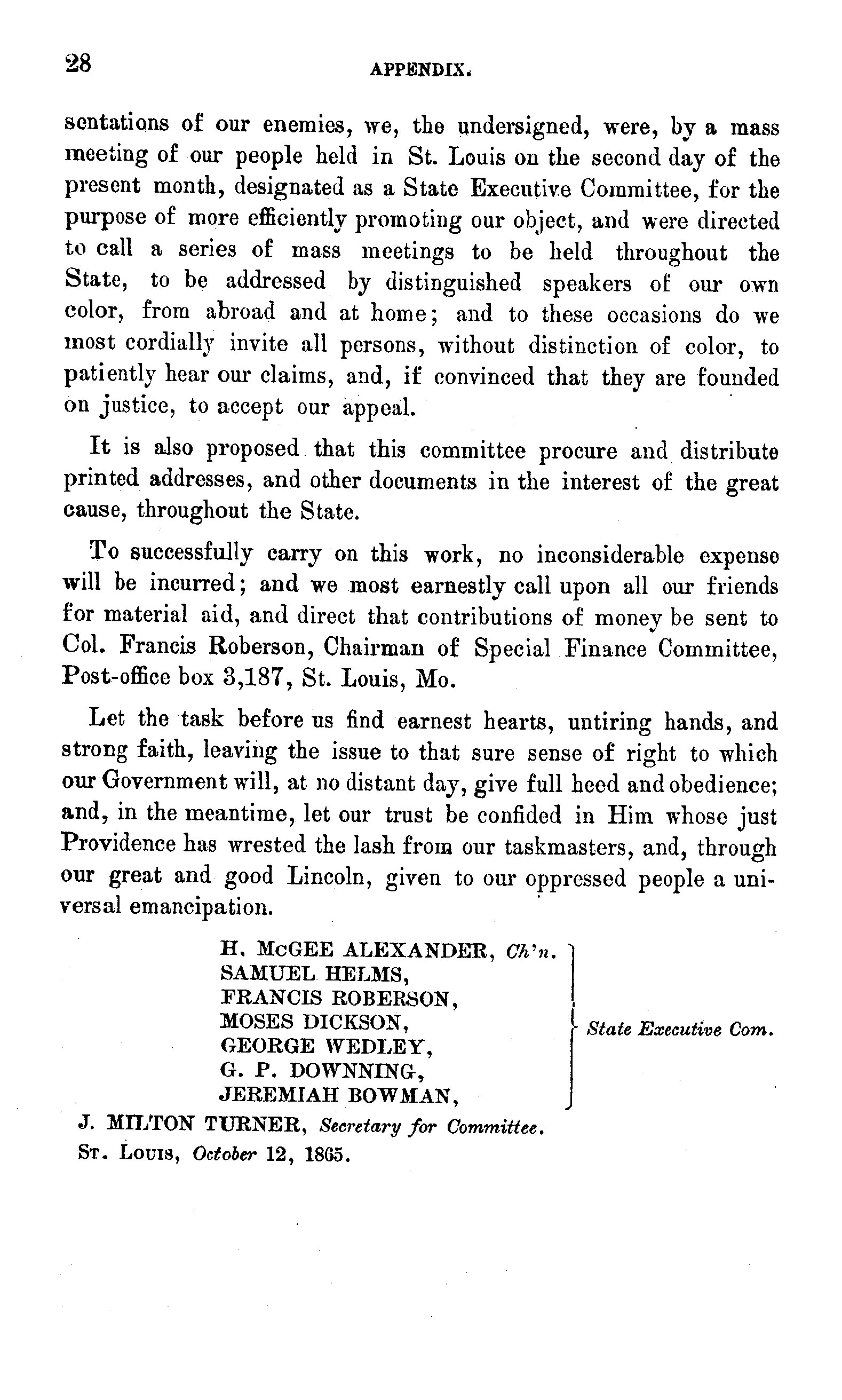
-
Description
In this pamphlet put together by the Missouri State Executive Committee, a speech delivered by John Mercer Langston on January 9th, 1866 called for political emancipation for African Americans. Also within this pamphlet, an address by the Colored People of Missouri to the Friends of Equal Rights strived to make manhood, not color, the basis of suffrage and thanked God for using President Lincoln to emancipate African American slaves.
-
Source
-
Rights
This item is in the public domain and may be reproduced and used for any purpose, including research, teaching, private study, publication, broadcast or commercial use, with proper citation and attribution.
-
Creator
Missouri State Executive Committee
-
Publisher
Democrat Book and Job Printing House
-
Date
January 9, 1866
from Jul. 4, 1865
Colored People's Educational Monument Association Celebration
-
Full Title
Celebration by the Colored People's Educational Monument Association in Memory of Abraham Lincoln
-
Description
On July 4, 1865--the first Independence Day after Lincoln's assassination--the Colored People's Educational Monument Association held a celebration in Washington, D.C., in commemoration of Lincoln, featuring speeches by prominent individuals such as Elder D.W. Anderson, the pastor of Washington's Nineteenth Street Baptist Church, William Howard Day, Senator Henry Wilson of Massachusetts, Senator Michael Hahn of Louisiana, and General Edgar Gregory. The speakers reflected on what the past year's events had meant.
-
Source
-
Rights
This item is in the public domain and may be reproduced and used for any purpose, including research, teaching, private study, publication, broadcast or commercial use, with proper citation and attribution.
-
Tags
-
Cite this Item
Colored People's Educational Monument Association. "Celebration by the Colored People's Educational Monument Association in Memory of Abraham Lincoln". McGill & Witherow. Remembering Lincoln. Web. Accessed November 6, 2025. https://rememberinglincoln.fords.org/node/1128
-
Creator
Colored People's Educational Monument Association
-
Publisher
McGill & Witherow
-
Date
July 4, 1865
from Jul. 4, 1865
Celebration by the Colored People's Educational Monument Association in Memory of Abraham Lincoln
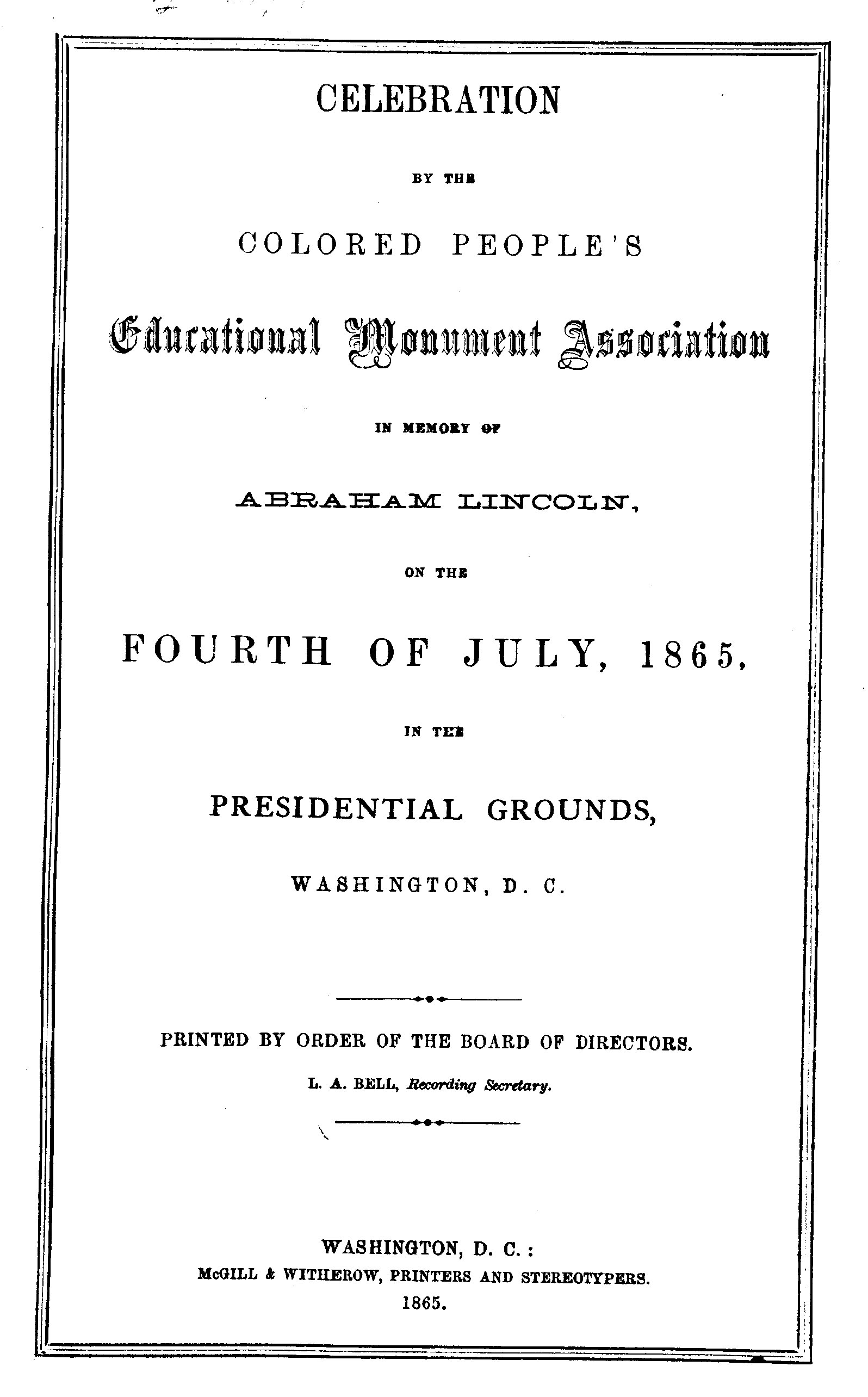
-
Description
On July 4, 1865--the first Independence Day after Lincoln's assassination--the Colored People's Educational Monument Association held a celebration in Washington, D.C., in commemoration of Lincoln, featuring speeches by prominent individuals such as Elder D.W. Anderson, the pastor of Washington's Nineteenth Street Baptist Church, William Howard Day, Senator Henry Wilson of Massachusetts, Senator Michael Hahn of Louisiana, and General Edgar Gregory. The speakers reflected on what the past year's events had meant.
-
Source
-
Rights
This item is in the public domain and may be reproduced and used for any purpose, including research, teaching, private study, publication, broadcast or commercial use, with proper citation and attribution.
-
Creator
Colored People's Educational Monument Association
-
Publisher
McGill & Witherow
-
Date
July 4, 1865
from Jan. 31, 1866
Joseph S. Caulk to Andrew Johnson and Edwin M. Stanton
-
Full Title
Joseph S. Caulk to Andrew Johnson and Edwin M. Stanton
-
Description
Joseph S. Caulk, a veteran of Company K of the 24th Regiment of the U.S. Colored Infantry, wrote to President Andrew Johnson and Secretary of War Edwin Stanton seeking permission to march while armed to honor the deceased President Abraham Lincoln's birthday in 1866. Caulk, a bricklayer from Delaware, enlisted in the U.S. Army at age 44 on March 28, 1865, shortly before the surrender of Confederate General Robert E. Lee.
-
Transcription
Wilmington Jan 31th 1866
Sir
Mr President or Secatary of Ware by Permishin i take the liberty to ask you to be so kind as to gave us the Returnd Soldears of the State of Delawear a permit to turn under armes on the 12th of Februeary to Silabrat of our Well belovid Mr Aberham Lincoln birth day our opposers has Sead the collard pepel Wor going to rase but person With comon Sence Wold know better yours With respect Write to
Joseph S. Caulk W. 7. St No 214
Wilmington, Del– -
Source
Shared by Jonathan White, associate professor of American Studies at Christopher Newport University. Joseph S. Caulk to Andrew Johnson and Edwin M. Stanton, January 31, 1866, in RG 107 (Records of the Office of the Secretary of War), microfilm M494 (Letters Received by the Secretary of War From the President, Executive Departments, and War Department Bureaus, 1862-1870), reel 84.
-
Rights
This item is in the public domain may be reproduced and used for any purpose, including research, teaching, private study, publication, broadcast or commercial use, with proper citation and attribution.
-
Tags
-
Cite this Item
Joseph S. Caulk. "Joseph S. Caulk to Andrew Johnson and Edwin M. Stanton". Remembering Lincoln. Web. Accessed November 6, 2025. https://rememberinglincoln.fords.org/node/1087
-
Creator
Joseph S. Caulk
-
Date
January 31, 1866
from Jan. 31, 1866
Joseph S. Caulk to Andrew Johnson and Edwin M. Stanton
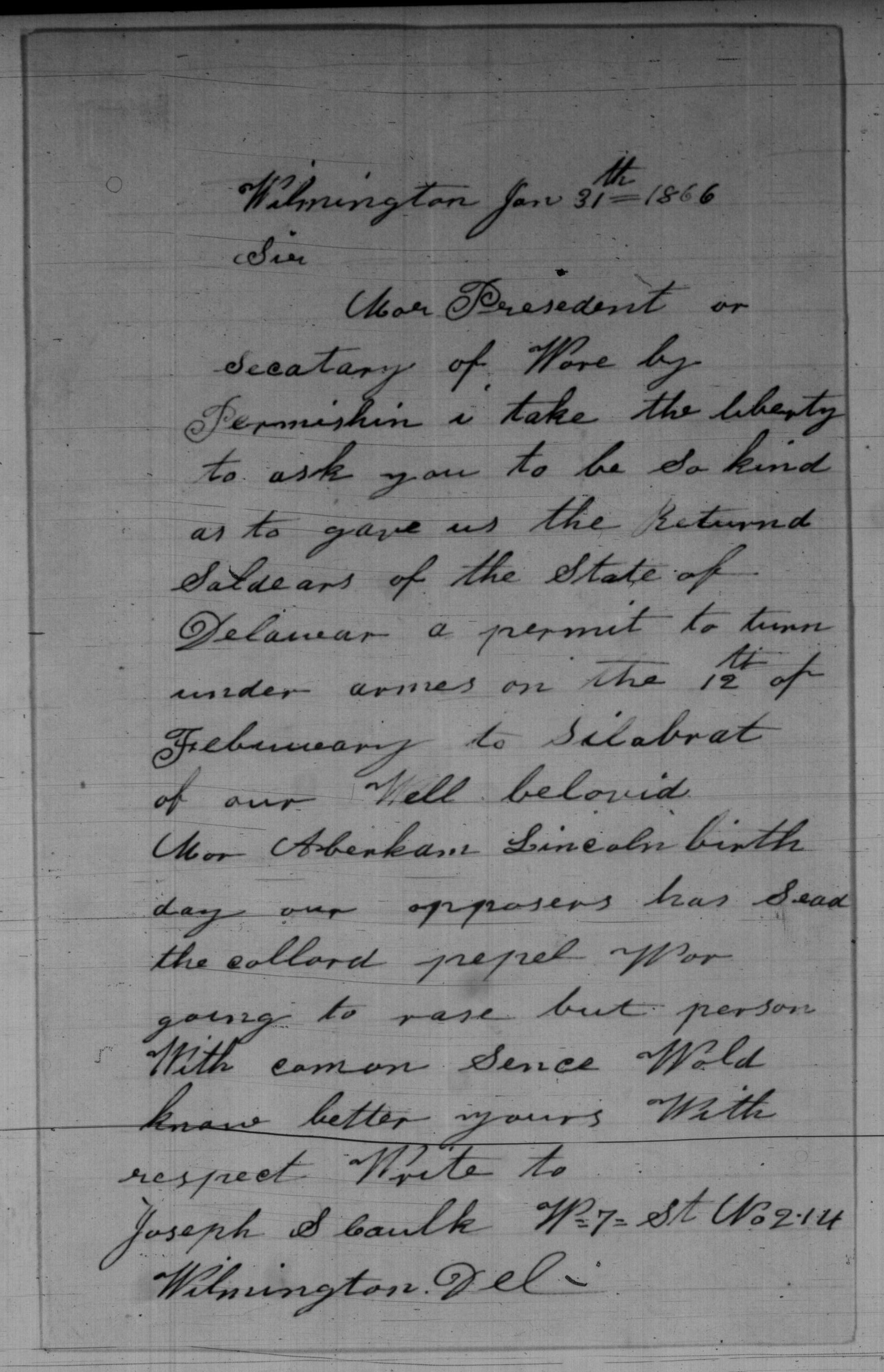
-
Description
Joseph S. Caulk, a veteran of Company K of the 24th Regiment of the U.S. Colored Infantry, wrote to President Andrew Johnson and Secretary of War Edwin Stanton seeking permission to march while armed to honor the deceased President Abraham Lincoln's birthday in 1866. Caulk, a bricklayer from Delaware, enlisted in the U.S. Army at age 44 on March 28, 1865, shortly before the surrender of Confederate General Robert E. Lee.
-
Source
Shared by Jonathan White, associate professor of American Studies at Christopher Newport University. Joseph S. Caulk to Andrew Johnson and Edwin M. Stanton, January 31, 1866, in RG 107 (Records of the Office of the Secretary of War), microfilm M494 (Letters Received by the Secretary of War From the President, Executive Departments, and War Department Bureaus, 1862-1870), reel 84.
-
Rights
This item is in the public domain may be reproduced and used for any purpose, including research, teaching, private study, publication, broadcast or commercial use, with proper citation and attribution.
-
Creator
Joseph S. Caulk
-
Date
January 31, 1866
from Dec. 15, 1865
Abraham Lincoln, a Speech
-
Full Title
Abraham Lincoln, a Speech
-
Description
In this speech, Frederick Douglass reflected on how the outpouring of joy at the conclusion of the Civil War turned to mourning with Lincoln’s assassination. His death, according to Douglass was not only tragic, but also prevented recently freed slaves and African Americans from gaining the ear of wise and well-intentioned leader. Towards the end of his speech, Douglass pondered how life would have been different had Lincoln not perished in April, lamenting that his death was a great blow against African American rights.
-
Transcription
Colored men, first to the brave Colored Soldiers who had fought under our flag and second to the very intelligent part of the Colored population South. This declaration on his part though it seemed to mean but little meant a great deal. It was like Abraham Lincoln. He never shocked prejudices unnecessarily. Having learned Statesmanship while splitting rails, he always used the thin edge of the wedge first, and the fact that he used this at all meant that he would if need be, use the thick as well as the thin. He saw the absurdity of asking men to fight for a Government which should degrade them, and the meanness of enfranchising enemies and de-franchising friends. He was a progressive man, a humane man, an honorable man, and at heart an antislavery man. He had exhausted the resources of conciliation upon rebels and slaveholders and now looked to the principles of Liberty and justice, for the peace, security, happiness and prosperity of his Country. I assume therefore, had Abraham Lincoln been spared to see this day, the negro of the South would have more than a hope of enfranchisement and no rebels could hold the reins of Government in any one of the late rebellious States. Whosoever else have cause to mourn the loss of Abraham Lincoln, to the Colored people of the Country his death is an unspeakable calamity.
[Transcription by: Evan Laugen, Chandra Manning's class, Georgetown University]. -
Source
Frederick Douglass Papers, Manuscript Division, Library of Congress
-
Rights
This item is in the public domain and may be reproduced and used for any purpose, including research, teaching, private study, publication, broadcast or commercial use, with proper citation and attribution.
-
Tags
-
Cite this Item
Frederick Douglass. "Abraham Lincoln, a Speech". Remembering Lincoln. Web. Accessed November 6, 2025. https://rememberinglincoln.fords.org/node/812
-
Creator
Frederick Douglass
-
Date
Late December 1865
from Dec. 15, 1865
Abraham Lincoln, a Speech
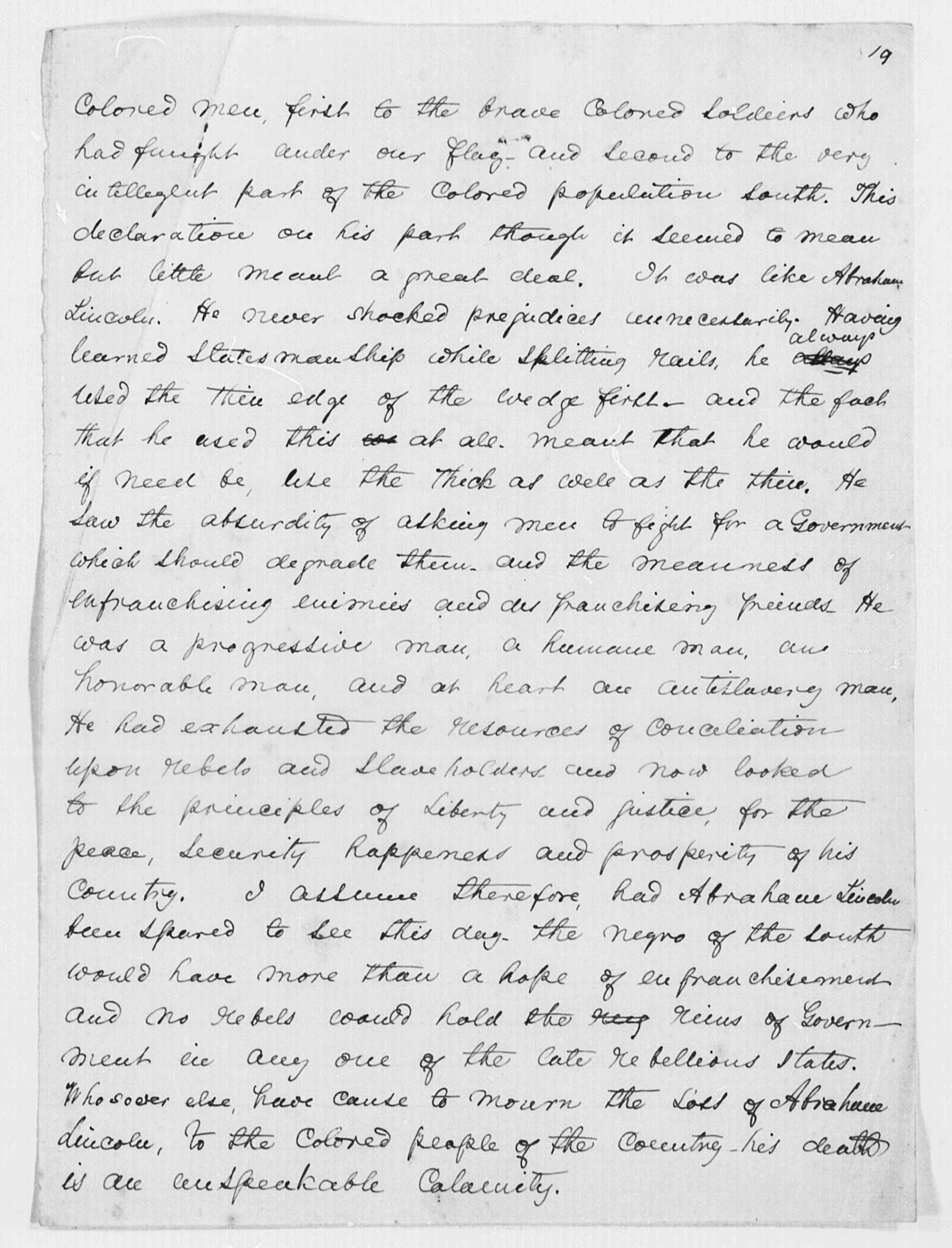
-
Description
In this speech, Frederick Douglass reflected on how the outpouring of joy at the conclusion of the Civil War turned to mourning with Lincoln’s assassination. His death, according to Douglass was not only tragic, but also prevented recently freed slaves and African Americans from gaining the ear of wise and well-intentioned leader. Towards the end of his speech, Douglass pondered how life would have been different had Lincoln not perished in April, lamenting that his death was a great blow against African American rights.
-
Source
Frederick Douglass Papers, Manuscript Division, Library of Congress
-
Rights
This item is in the public domain and may be reproduced and used for any purpose, including research, teaching, private study, publication, broadcast or commercial use, with proper citation and attribution.
-
Creator
Frederick Douglass
-
Date
December 15, 1865
from Apr. 15, 1865
Emilie Davis Diary
-
Full Title
Emilie Davis Diary
-
Description
Emilie Davis, a free African American living in Philadelphia, recorded the events of her life from 1863 to 1865, including the end of the Civil War and the Lincoln assassination.
-
Transcription
MONDAY, APRIL 10, 1865
raining all day in the evening it [...] off [...] i went to mr livelys he did not come to sermon egerton come up here with Ellen
TUESDAY, APRIL 11, 1865
quite pleasent i have bin very busy all day this evening i was too tired to go to meeting Vincent did not come up this evening
WEDNESDAY, APRIL 12, 1865
this has bin quite a stressing week very [...] mrs Jones [...] i have bin with him [...] to get my Dress done
THURSDAY, APRIL 13, 1865
very Pleasent Miss Janice started for Baltimore this morning in Concequence i did not get to the [...] al lesson spent most of the evening home
FRIDAY, APRIL 14, 1865
to day is the day we Celebrate the soldiers Parrade a flag was presented to the reggiment by the [...] very Plesent it every body seemed to have a holidy
SATURDAY, APRIL 15, 1865
very sad newes was received this morning of the murder of the President the city is in deep mourning we had a meeting of the association
SUNDAY, APRIL 16, 1865
it Decided to PosPone the fare very fine Day everyone seems to Partake of the solemnity of the times Docto Jones spoke for us
MONDAY, APRIL 17, 1865
to day was set aPart for a general holiday but seemes to me a day of mourning i went to mr livelys then to school mr ling was not very lively
TUESDAY, APRIL 18, 1865
nothing special on home to day meeting at night not good meeting after meeting Nell and went to Sarah Shines Vincent invisible
WEDNESDAY, APRIL 19, 1865
to day is a general holiday the churches are open and the day has the apperanece of Sunday the Preisedent is concidered buried today i was out in the afternoon we Did not have church mr gibbs being away Vincent was up a little while
THURSDAY, APRIL 20, 1865
everything assumes a solem aspect the streets look mournful the people more so i went to mr livelys in the afternoon i did not get far from it rained all the afternoon and evening i spent the evening with Nellie
FRIDAY, APRIL 21, 1865
cloudy and very dark the funeral Prossion Pass through tomorrow i have not bin out to day i am tired of the st Vincent was up this evening he is so full of business
SATURDAY, APRIL 22, 1865
lovely morning to is the day long to be remembered i have bin very busy all morning the President comes in town this afternoon i went out about 3 in the afternoon it was the gravest funeral i ever saw
SUNDAY, APRIL 23, 1865
the coffin and hearse was beutiful this morning went down to see the President but could not for the crowd mr robinson spoke for us in the afternoon very interesting sermon after church Vincent and i tried to get to see the President
MONDAY, APRIL 24, 1865
i got to see him after waiting four hours and a half it was [...] a sight worth seeing very Pelesent i did not to mr lively we went to the concert it was very nice with one exception lizzie [...] sing
TUESDAY, APRIL 25, 1865
miserable the rest done well very good house very fine day i stoped at mr Jonsons a little while Nellie and i went to see Sarah Shim then to meeting very good meeting after meeting went down town
WEDNESDAY, APRIL 26, 1865
quite warm to day i have soore throat as a [...] Sunday adventure nothing of intrest to day Nell come up this evening she has not spent an evening with me for some time
THURSDAY, APRIL 27, 1865
very much like summer today very Plesent i went down to mr livleys in the afternoon Nell i went out shoping i went down to [...] a little while in the evening i spent at home
-
Source
Historical Society of Pennsylvania (images); Emilie Davis Diaries Project at Villanova University (transcription)
-
Rights
Use of this item for research, teaching, and private study is permitted with proper citation and attribution. Reproduction of the images of this item for publication, broadcast, or commercial use requires written permission from the Historical Society of Pennsylvania. Reproduction of the transcription of this item for publication, broadcast, or commercial use requires written permission from Villanova University.
-
Tags
-
Cite this Item
Emilie Davis. "Emilie Davis Diary". Remembering Lincoln. Web. Accessed November 6, 2025. https://rememberinglincoln.fords.org/node/549
-
Creator
Emilie Davis
-
Date
April 15, 1865
from Apr. 15, 1865
Emilie Davis Diary
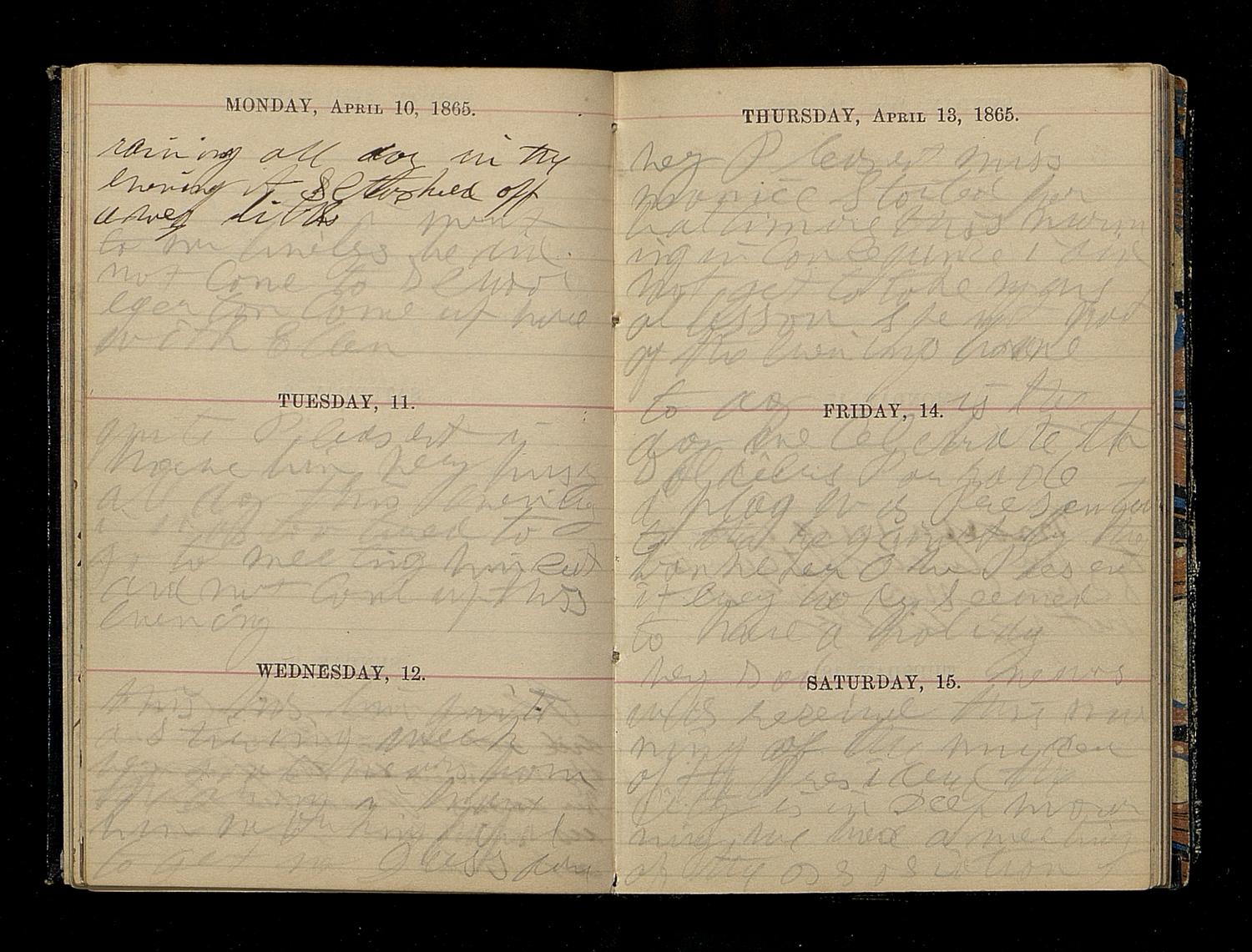
-
Description
Emilie Davis, a free African American living in Philadelphia, recorded the events of her life from 1863 to 1865, including the end of the Civil War and the Lincoln assassination.
-
Source
Historical Society of Pennsylvania (images); Emilie Davis Diaries Project at Villanova University (transcription)
-
Rights
Use of this item for research, teaching, and private study is permitted with proper citation and attribution. Reproduction of the images of this item for publication, broadcast, or commercial use requires written permission from the Historical Society of Pennsylvania. Reproduction of the transcription of this item for publication, broadcast, or commercial use requires written permission from Villanova University.
-
Creator
Emilie Davis
-
Date
April 15, 1865
from Apr. 17, 1865
James Wormley, G. Snowden, and H. Harris to George Harrington
-
Full Title
Letter of James Wormley, G. Snowden, and H. Harris, Washington, [to George Harrington], April 17, 1865
-
Description
States, "It's chairman of the Committee of Colored Citizens of Washington - who desire to participate in the funeral ceremonies of our late President - and friend, Abraham Lincoln. I have to solicit the favor of being placed in such a position in the line of procession as you may assign. . . ."
-
Source
George R. Harrington Papers, Missouri History Museum Archives, St. Louis.
-
Rights
Please contact the Missouri History Museum at photo@mohistory.org for permission to publish this resource.
-
Tags
-
Cite this Item
Wormley, James, 1819-1884; Snowden, G.; Harris, H.. "Letter of James Wormley, G. Snowden, and H. Harris, Washington, [to George Harrington], April 17, 1865". Remembering Lincoln. Web. Accessed November 6, 2025. https://rememberinglincoln.fords.org/node/524
from Apr. 17, 1865
Letter of James Wormley, G. Snowden, and H. Harris, Washington, [to George Harrington], April 17, 1865
![Letter of James Wormley, G. Snowden, and H. Harris, Washington, [to George Harrington], April 17, 1865](https://rememberinglincoln.fords.org/sites/default/files/A0653_20.jpg)
-
Description
States, "It's chairman of the Committee of Colored Citizens of Washington - who desire to participate in the funeral ceremonies of our late President - and friend, Abraham Lincoln. I have to solicit the favor of being placed in such a position in the line of procession as you may assign. . . ."
-
Source
George R. Harrington Papers, Missouri History Museum Archives, St. Louis.
-
Rights
Please contact the Missouri History Museum at photo@mohistory.org for permission to publish this resource.
-
Creator
Wormley, James, 1819-1884; Snowden, G.; Harris, H.
-
Date
April 17, 1865
